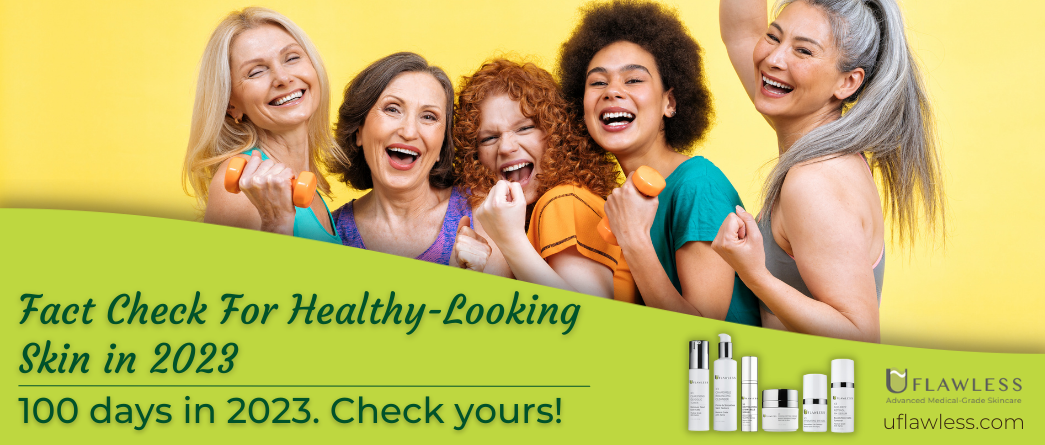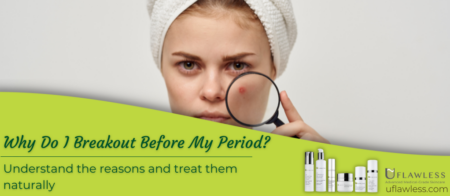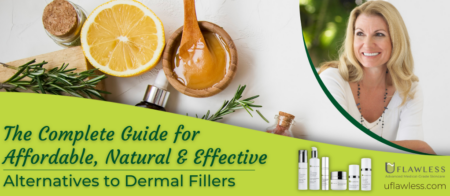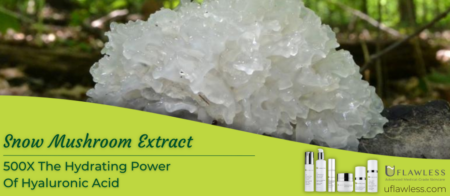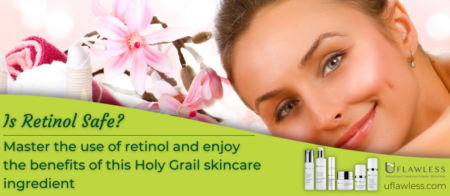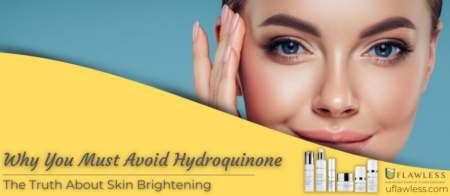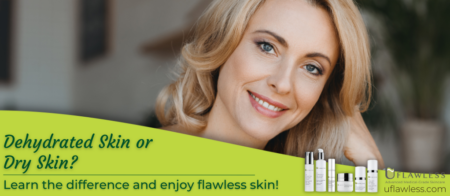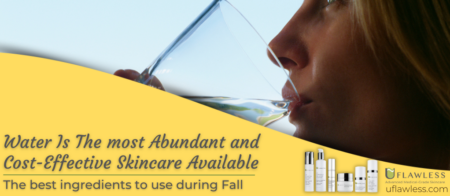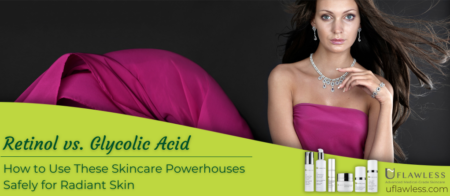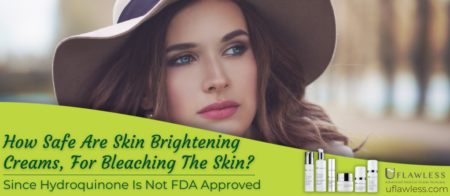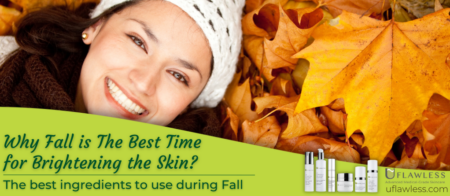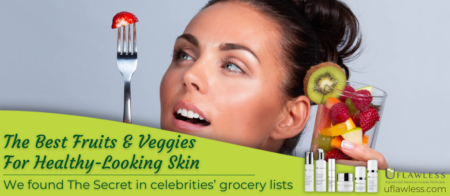Fact Check Your Skin For Healthy-Looking Skin in 2023
As we just completed 100 days into 2023, it’s time for a recap to fact-check if you’re on your way to healthy-looking skin in 2023.
Super Models, Scientific Facts, And Healthy-Looking Skin
Let’s dive into facts supported by scientific studies and tested with Super Models who were considered to have amazing healthy looking skin.
This is the best way to fact-recap your skin goals for 2023.
Is flawless skin still one of your priorities for the coming year?
Whether you’ve considered it or not, establishing a skincare routine and understanding the science behind it can lead to remarkable improvements in your complexion.
Here are some science-backed habits and examples that will help you achieve perfect skin in 2023:
Acknowledge the Benefits of Drinking Water for Perfect Skin ✔️
You’ve probably heard that drinking eight to twelve (8-12) glasses of water per day is essential for optimal health.
This recommendation is backed by science, as our body and cells are composed of sixty to seventy percent (60%-70%) water.
Adequate hydration is crucial for maintaining skin elasticity, vibrancy, and overall health.
Research conducted on the top 10 supermodels around the world revealed that they all consume a minimum of 8-12 glasses of water per day, with some even drinking up to fifteen (15).
When you incorporate this healthy habit into your lifestyle, you’ll quickly notice a more elastic and vibrant complexion.
Drinking water aids in flushing toxins from your body, which in turn contributes to a clearer, healthier complexion.
A study published in the Journal of Clinical, Cosmetic, and Investigational Dermatology found that increased water intake significantly improved skin hydration and skin physiology.
Use Sunscreen for Face to Get Perfect Skin in 2023 ✔️
Sunscreen for the face has become as important as drinking water.
The sun is the number one factor contributing to premature aging, including wrinkles, dark spots, decreased elasticity, and skin regeneration.
If you’re using skincare treatments containing retinol or acids, sun protection is even more critical.
Dermatologists recommend using sunscreen with a minimum Sun Protection Factor (SPF) of 15, but an SPF of 30 is ideal as it filters out 97% of harmful UV rays.
In a study published in the Journal of the American Academy of Dermatology, researchers found that daily use of SPF 30 sunscreen reduced the risk of developing melanoma by 80%.
When choosing a sunscreen, opt for products containing zinc oxide.
Zinc oxide is a safer option and provides better skin protection.
Apply sunscreen after any skincare products, as it acts as a barrier and shouldn’t block the absorption of your anti-aging or acne treatments.

Skincare Trend for 2023: Protect your skin against UVA/UVB and HEV Light ✔️
Sunscreen with a broad spectrum nowadays is NOT ONLY the one that protects your skin from UVA and UVB Light.
The trend for sunscreen for 2023 and on is the sunscreen that protects you against HEV Light.
HEV light, also known as high-energy visible light or blue light, is a type of light with wavelengths ranging from 380 to 500 nanometers. (See picture above). HEV light is emitted by the sun and electronic devices such as smartphones, computers, and televisions.
While HEV light is not as harmful as UV light, prolonged exposure to HEV light can have negative effects on our skin and eyes. Some of the effects of HEV light exposure include:
- Skin damage: HEV light can penetrate deep into the skin and cause damage to collagen and elastin, leading to premature aging and the development of wrinkles and fine lines.
- Eye strain: Exposure to HEV light can cause eye strain, headaches, and fatigue, especially when using electronic devices for extended periods of time.
- Disruption of sleep patterns: HEV light can interfere with the body’s natural sleep-wake cycle by suppressing melatonin production, a hormone that regulates sleep.
To protect ourselves from the negative effects of HEV light, it is important to limit our exposure to electronic devices, especially at night.
Some ways to reduce HEV light exposure include using blue light-blocking glasses, adjusting the brightness and contrast of electronic devices, and taking regular breaks to rest our eyes.
Additionally, using skincare products that contain antioxidants can help to protect the skin from HEV light damage.
Wash Your Face at Least Once a Day with a Good Cleanser to Get Perfect Skin in 2023 ✔️
Washing your face daily is vital for removing oil, dirt, pollution, and debris that can clog pores and impair your skin’s ability to “breathe” properly.
These particles can harbor harmful bacteria, which may lead to skin issues.
Cleansing your face daily keeps your skin looking fresh and healthy.
A study published in the Journal of Cosmetic Science found that using a gentle facial cleanser with natural ingredients significantly improved skin barrier function and reduced skin dryness.
Cleansing your face twice daily, particularly if you have oily or acne-prone skin, can yield even better results.
Make Use of a Top-Quality Retinol Serum to Get Perfect Skin ✔️
Retinol, an active form of vitamin A, is considered a miracle ingredient for the skin.
It is widely used by celebrities and is known for its ability to promote skin cell turnover, elastin production, and collagen synthesis.
Retinol can be used at any age and is available in various concentrations, making it suitable for all skin types.
A study published in the Journal of Drugs in Dermatology found that retinol significantly improved fine lines, wrinkles, and overall skin appearance.
Consult a skincare expert or dermatologist to find the right retinol serum for your skin type and concerns.
High-Quality Retinol is essential to get results without side effects
Side effects such as flaky skin, itchiness, and redness are some of the most common side-effects from Retinol.
Here’s one of the best options with 100% Satisfaction Guaranteed!
Get Antioxidant Foods for Perfect Skin ✔️
You are what you eat, and this is particularly true for healthy eating and its effects on your skin.
Consuming antioxidant-rich foods can help combat free radicals, which are responsible for age-related damage to your skin.
A study published in the American Journal of Clinical Nutrition found that higher intakes of vitamin C and linoleic acid, both potent antioxidants, were associated with healthier, more youthful-looking skin.
Antioxidant-rich foods include berries, nuts, and dark green vegetables.
Nature’s Vitamin C & Linoleic Acid Power Foods
Boost your skin health with vitamin C-rich foods like oranges, strawberries, and kiwi.
The most common foods high in linoleic acid, are sunflower seeds, almonds, and flaxseed oil.
Using antioxidant-infused skincare products can further enhance your skin’s glow from the inside out.
Sweat for Healthy Perfect Skin ✔️
Sweating is beneficial for the skin, as it opens pores and promotes the rapid elimination of toxins from your body.
The water you drink helps flush out harmful substances and sweating aids in this detoxification process.
However, it’s essential to cleanse your skin immediately after sweating to prevent irritation caused by ammonia and urea, two irritants found in sweat.
Exercise is also beneficial for the skin, as it increases blood flow and promotes the release of endorphins.
A study published in the Journal of Applied Physiology found that regular exercise enhances skin health and appearance, contributing to a more youthful complexion.
Beauty Sleep for Perfect Skin ✔️
Adequate sleep is essential for overall health, including your skin.
When you sleep, your body undergoes various processes, such as hydration balance, hormonal balance, and blood flow regulation, which contribute to a healthy immune system and glowing skin.
A study published in the Journal Sleep found that individuals who slept for seven to nine hours per night had significantly better skin health and appearance compared to those who slept less.
Establishing a relaxing pre-sleep routine, such as practicing meditation or deep breathing exercises, can help ensure a restful night’s sleep.
Science Behind Skincare Ingredients
Understanding the science behind skincare ingredients can help you choose products that effectively target your skin concerns.
For instance, ingredients like hyaluronic acid, niacinamide, and peptides have been scientifically proven to improve skin hydration, reduce inflammation, and promote collagen production, respectively.
A study published in the Journal of Cosmetic Dermatology found that using a skin care product containing a combination of these ingredients significantly improved skin hydration, elasticity, and overall appearance.
By selecting products with scientifically backed ingredients, you can achieve better results in your quest for perfect skin.
-
X3 Dermal Filler in a Bottle Routine |
Original price was: $339.00.$261.00Current price is: $261.00.
Make this fact checks for healthy-looking skin in 2023 your Daily Routine.
By implementing these science-backed habits into your daily routine, you’ll be well on your way to achieving perfect skin in 2023.
Start by prioritizing hydration, sun protection, and a consistent skincare regimen tailored to your needs.
Incorporate antioxidant-rich foods into your diet, exercise regularly, and prioritize sleep to promote optimal skin health.
Additionally, understanding the science behind skincare ingredients will help you choose the most effective products for your skin type and concerns.
With dedication and consistency, you’ll be able to achieve a radiant, glowing complexion that will make 2023 your best skin year yet.
References for a fact check on healthy-looking skin in 2023
- American Academy of Dermatology Association. (n.d.). Sunscreen FAQs. Retrieved from https://www.aad.org/public/everyday-care/sun-protection/sunscreen-patients/sunscreen-faqs
- National Center for Biotechnology Information. (2017). A Randomized Controlled Study of the Effects of Daily Water Intake on Skin Physiology. Retrieved from https://www.ncbi.nlm.nih.gov/pmc/articles/PMC5661189/
- Oregon State University, Linus Pauling Institute. (n.d.). Micronutrient Information Center: Antioxidants and Health. Retrieved from https://lpi.oregonstate.edu/mic/health-disease/antioxidants


